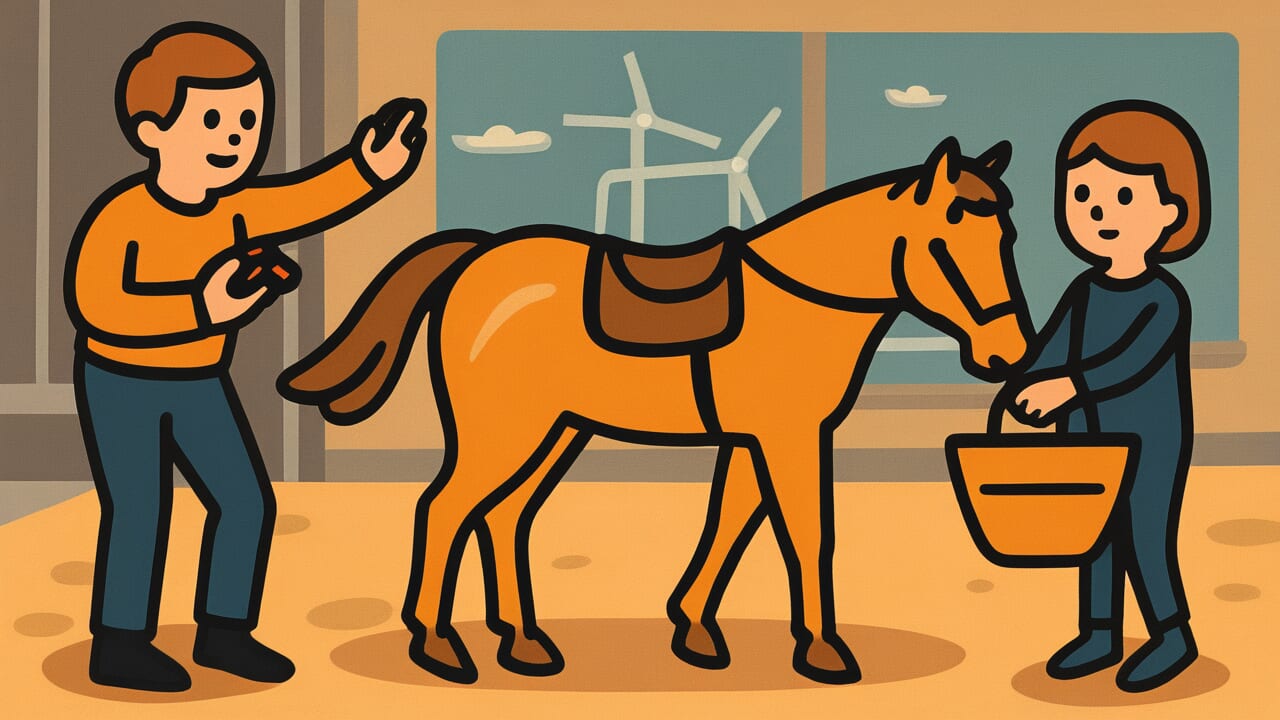How to Read “Teach children to death, keep horses to death”
Kodomo wa oshie korose, uma wa kai korose
Meaning of “Teach children to death, keep horses to death”
This proverb teaches that children should be educated strictly, while horses should be raised with care.
For children, the idea is not to spoil them. Sometimes you need to scold them firmly and teach them the right path. This benefits their future.
Because you love them, you don’t let them choose the easy road. You help them develop the strength to face difficulties.
On the other hand, livestock like horses should not be treated harshly. Give them plenty of food and rest, and maintain their health. This way they perform their best work.
In other words, you should change how you treat someone based on their nature. This is the wisdom here.
Few people keep horses today, but the essence of this teaching remains unchanged. Humans grow through challenges, so education requires strictness. This way of thinking still guides parenting and education today.
Origin and Etymology
The exact source of this proverb is unclear, but people likely used it from the Edo period onward.
The intense expression “to death” might surprise you at first. However, the word “korose” here is used differently from its modern meaning.
In “teach to death,” the word “korose” is an emphatic expression meaning thoroughly or to the limit. It shows the idea that you should educate children strictly without spoiling them, drawing out their maximum potential.
Meanwhile, in “keep to death,” the word “korose” means to care for something so carefully that you almost overdo it.
Horses were precious property at that time. They supported family life through farm work and transportation. If you treated them poorly, they couldn’t work, dealing a huge blow to the household budget.
That’s why people needed to give them food generously and care for them carefully.
This proverb contrasts two beings closely connected to daily life at the time: children and horses. It teaches that each requires an appropriate way of raising.
Humans grow through strictness, while animals show their strength through loving care. This contrasting wisdom has been passed down through generations with memorable phrasing.
Usage Examples
- That teacher follows the principle “Teach children to death, keep horses to death”—strict with students but truly gentle with his pet dog
- My grandfather’s catchphrase was “Teach children to death, keep horses to death”—he was strict with his grandchildren but gave his beloved dog the finest food
Universal Wisdom
Behind this proverb lies deep insight into human growth. Why do human children need strictness?
It’s because humans aren’t beings who live by instinct alone. We have reason and will, and we carve out our own lives.
Children who are spoiled and constantly protected from difficulties lack the power to overcome obstacles when they become adults.
In contrast, people raised with appropriate strictness can face difficulties without fearing failure. They develop the courage to confront challenges.
Parental and teacher strictness is actually an expression of deep love. Letting children choose the easy path is simple, but it can rob them of their future.
At the same time, this proverb teaches that you shouldn’t apply the same method to everything.
If you treat horses harshly, they become frightened and can’t show their true abilities. For non-human creatures, providing security and safety is best.
Our ancestors understood human uniqueness. We are the only beings in this world who grow through difficulties.
That’s why true love sometimes involves strictness. This is what the proverb continues to teach us.
When AI Hears This
This proverb demonstrates a principle where optimal control methods become completely opposite for systems with intelligence versus those without.
Children are systems with learning ability. They can take in external information and update their own behavioral models.
When you intervene too much in such systems, “overfitting” occurs. In machine learning, for example, AI that’s too fitted to training data makes poor judgments in new situations.
Children are the same. When parents give too many detailed instructions, they can only follow manuals and can’t handle unexpected problems. Over-teaching robs them of generalization ability.
Horses, on the other hand, move by instinct and conditioned reflexes. Learning-based behavioral optimization is limited. Instead, they react directly to environmental stimuli.
Such systems need continuous input. This resembles feedforward control in control engineering. Without constantly sending appropriate signals, performance drops.
If you neglect horses, they become wild and won’t move as humans intend.
What’s interesting is that modern AI development sits exactly on this boundary line.
You give reinforcement learning AI room for trial and error. You give simple automation systems clear rules.
A 300-year-old proverb strikes at the core of modern control theory: optimizing intervention levels according to a system’s autonomy level.
Lessons for Today
This proverb teaches us the wisdom of understanding someone’s true nature and adjusting how we treat them.
When you’re in a position to raise someone, think about what true kindness means. Is protecting them from immediate difficulties love?
Or is believing in their power to overcome those difficulties, and deliberately not reaching out your hand, the real love?
In modern society, people tend to avoid scolding children strictly. However, appropriate strictness can only be shown because you believe in a child’s potential.
You can demand high standards because you trust that “you can do this.”
At the same time, this proverb teaches the danger of uniform methods. Even in human relationships, treating everyone the same way doesn’t work.
Some people need encouragement. Others need quiet watching over. Understanding someone’s nature and choosing how to engage with them accordingly—isn’t that true compassion?
Observe the people around you carefully once more. You should see what they truly need.



Comments